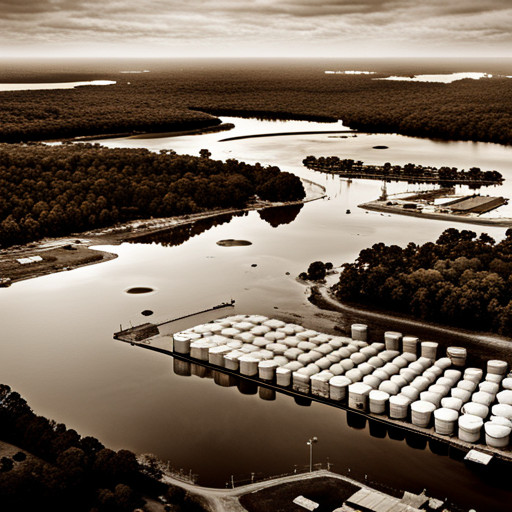Cancer Risks and Lawsuits Camp Lejeune Water Contamination
The contamination of Camp Lejeune's water supply, allegedly leading to significant health issues, forms the crux of an escalating legal battle. This article delves into the connection between the reported health problems, including various cancers, and the base's polluted water.

Furthermore, it scrutinizes the ongoing lawsuits, the delayed implementation of the Camp Lejeune Justice Act, and the long-term health implications for those exposed to the contamination.
Key Takeaways
- Lawsuits have been filed alleging cancer caused by tap water contamination at Camp Lejeune base.
- The Marine Corps was aware of the compromised water treatment facilities that led to the contamination.
- The primary cause of contamination was a hazardous dry cleaning solvent.
- Drinking the contaminated water increased the risk of various cancers and adverse health effects.
Understanding the Scope of Water Contamination at Camp Lejeune

The scope of water contamination at Camp Lejeune is extensive. Evidence suggests that harmful substances such as hazardous dry cleaning solvent and PFAS chemicals from firefighting foam have infiltrated the water supply. This contamination has led to a plethora of health issues, including various forms of cancer and Parkinson's disease, among the base's inhabitants.
Examining the health effects of this contamination reveals a significant increase in adverse health outcomes. The residents of Camp Lejeune have experienced a higher incidence of diseases and illnesses associated with the contaminated water. The long-term health consequences are alarming and have raised concerns about the safety of military bases and their water supplies.
The legal implications of this contamination are equally significant. Numerous lawsuits have been filed against the U.S. government, alleging negligence and failure to ensure the safety of the base's water supply. The affected individuals and their families seek compensation for the damages they have suffered due to the contaminated water.
Analyzing these legal implications, it becomes clear that the situation at Camp Lejeune represents a critical case study in environmental health and legal responsibility. The government's duty to protect the health and well-being of its service members and their families is being called into question. The outcome of these lawsuits will have far-reaching consequences for future cases involving environmental contamination and the responsibility of government agencies.
Delving Into the Causes of Water Contamination on the Base

Investigations into the origins of the hazardous pollutants revealed several local sources. These included improper waste disposal by dry cleaners, unlined underground waste repositories, and the use of PFAS-laden firefighting foam. These practices, in conjunction with a lack of adequate oversight and regulation, contributed to significant water contamination on the Camp Lejeune base.
The contaminants found in the water supply are known for their carcinogenic properties. Their presence has been linked to the development of several health effects, including various forms of cancer.
Cases of contamination such as this underscore the need for stringent regulations pertaining to waste disposal and the use of hazardous materials. Additionally, comprehensive monitoring of water quality is necessary to prevent similar incidents in the future.
Recent Developments in the Camp Lejeune Water Contamination Lawsuits

Recent developments in legal proceedings have brought new attention to the longstanding issues related to environmental hazards on military bases, shedding light on the health implications for veterans and their families.
The focus is particularly on Camp Lejeune, where survivor accounts highlight the severe health impacts from contaminated water exposure. Such accounts provide compelling evidence, illuminating the gravity of the situation.
These testimonies are crucial in the ongoing Bellwether trials, potentially influencing the determination of payout levels for plaintiffs. Notably, these trials serve as a precedent for subsequent cases and could significantly impact the course of the legal proceedings.
The outcome of these trials could establish a benchmark for compensation, thereby potentially defining the future of justice for victims of environmental hazards on military bases.
The Impact of Legislative Measures on the Camp Lejeune Justice Act

Legislative measures have significantly impacted the progression and potential outcomes of the Justice Act, aimed at providing compensation and justice for affected military personnel and their families. The Act is critical in addressing the aftermath of the Camp Lejeune water contamination and its ensuing health crises.
The impact of compensation is multifaceted, extending beyond financial relief to encompass elements of justice and acknowledgment of suffering. Legislative measures have expedited the processing of claims. The impact of compensation is profound, providing financial relief and a sense of justice.
Widows seeking justice have been a driving force behind the Act. The Act has highlighted the importance of transparency in military operations. Delays in legislation have underscored the urgency of addressing public health crises.
This Act demonstrates the vital role of legislation in redressing past wrongs and paving the way for future preventative measures.
Navigating Claims Under the Camp Lejeune Justice Act

Navigating the complexities of the claims process under the Justice Act requires a thorough understanding of the Act's provisions, eligibility criteria, and the documentation necessary to support a claim. The compensation process can seem daunting, especially when faced with legal challenges.
| Provisions of Justice Act | Eligibility Criteria | Required Documentation |
|---|---|---|
| Compensation for health issues | Proof of residency at Camp Lejeune | Medical records |
| Legal representation | Time frame of residency | Proof of water consumption |
| Expedited processing for certain conditions | Exposure to contaminated water | Witness statements |
| Limitations on claim amounts | Diagnosis of specific health conditions | Employment or school records |
| Appeals process | No other cause for condition | Military service records |
Understanding these facets of the Justice Act can streamline the claims process and assist in navigating any potential legal challenges, ultimately leading to a more efficient route to compensation.
The Long-term Health Implications of the Contamination

Long-term exposure to hazardous substances can lead to chronic health conditions and a decreased quality of life. The long-term health risks of Camp Lejeune water contamination are a testament to this fact. A significant number of victims have suffered from health conditions including, but not limited to, cancers, neurological disorders, and reproductive health issues.
- Long-term consumption of the contaminated water led to various types of cancer including kidney, liver, and bladder cancer.
- Neurological disorders like Parkinson's disease were also observed in victims.
- Reproductive health issues were common, especially in pregnant women exposed to the contaminated water.
- Many victims developed skin conditions and respiratory issues.
- A significant increase in mortality rate was observed among residents of Camp Lejeune.
Compensation for victims of Camp Lejeune water contamination remains a contentious issue, with many victims still seeking justice.
Unveiling the Truth: The Hidden Story of Camp Lejeune Water Contamination

This detrimental situation was further exacerbated by the government's negligence in promptly disclosing the severity of the contamination. The delayed release of vital information potentially resulted in thousands of avoidable cancer cases.
Frequently Asked Questions
What Are the Symptoms That Exposure to the Contaminated Water at Camp Lejeune Can Cause?
Exposure to water contamination at Camp Lejeune can result in various health complications, including cancer. Other symptoms include kidney disease, infertility, and neurological disorders. Contamination effects are generally more severe with longer exposure duration.
Was There Any Independent Investigation Conducted to Verify the Contamination Claims at Camp Lejeune?
Investigation transparency in the Camp Lejeune case was pursued through independent investigations, verifying contamination claims. These inquiries significantly contributed to the implementation of compensation measures for those affected by the water contamination.
What Were the Immediate Steps Taken by the Marine Corp When They Learned About the Water Contamination?
Upon the discovery of water contamination at Camp Lejeune, the Marine Corp initiated remediation efforts, conducted comprehensive water testing, and informed residents, although the full extent and implications of the contamination were not immediately disclosed.
Are There Any Preventative Measures Being Put in Place to Avoid Such Incidents in the Future at Military Bases?
Future safeguards at military bases entail stringent monitoring of water quality and stricter waste disposal regulations. Contamination remediation includes improved filtration systems and swift response mechanisms to address potential environmental risks promptly.
How Has the Water Contamination at Camp Lejeune Impacted the Trust of Military Personnel Towards the Marine Corp?
The water contamination crisis at Camp Lejeune has significantly eroded trust, inciting military skepticism towards the Marine Corp. This incident has notably undermined confidence, questioning the institution's commitment to personnel health and safety.

This post has been generated by AI and was not reviewed by editors. This is Not legal advice. Please consult with an attorney.




